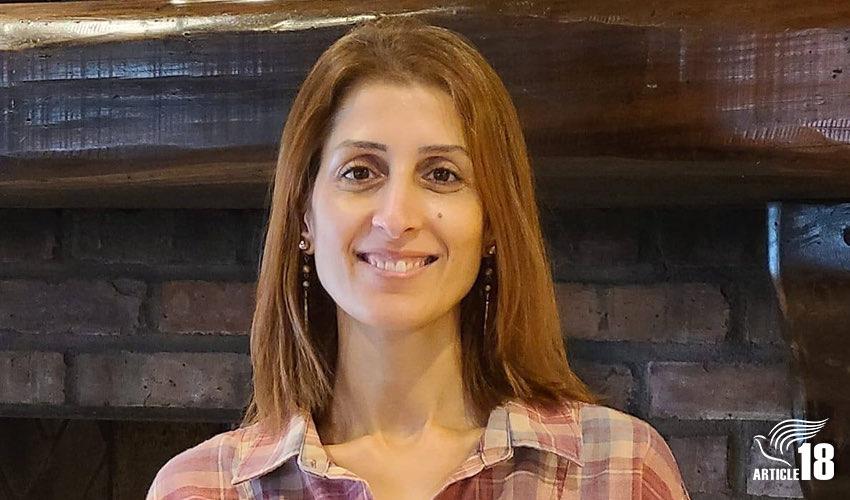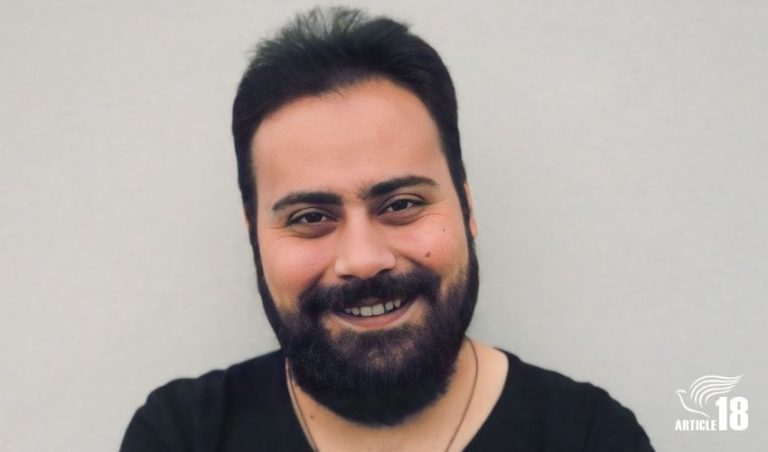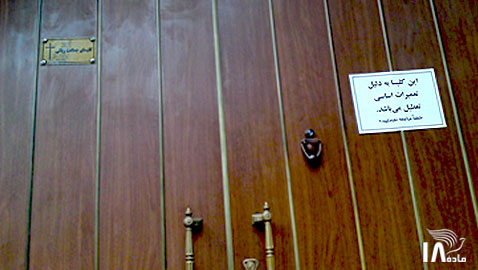
When Arina’s brother came to visit her in prison, he told her that if she refused to give up her Christian faith, he would no longer consider her his sister.
Like her interrogators before him, Arina’s brother told her she had been “deceived” into converting to Christianity and said he felt guilty for not supporting her enough through her divorce.
Arina replied: “I have been a Christian for three years now, and I am active in the church. My faith isn’t an emotional reaction to what I’ve been through. I have come to faith as a result of personal research, and I’m not willing to give it up.”
Arina, whose full name is Fatemeh Zarei, was one of half a dozen Christian women arrested during a raid on a house-church leader’s meeting in Shahin Shahr, near Isfahan, in February 2013.
It was around 8.30pm when the agents arrived. By 10pm, they were ushering Arina out of the apartment, into her own car.
Two agents accompanied her, while another followed in a separate car.
Throughout the 45-minute drive to her home in Isfahan, Arina says “they humiliated and insulted me as much as they could, and said such nasty things to me”.
But what really worried Arina was the thought of her elderly mother, whom Arina cared for and helped to get ready for bed.
During the raid, Arina says she “begged the agents and their supervisor many times” to let her phone her mother, while “at the same time my mother kept calling, and the phone rang continuously”.
Eventually, she was allowed to answer, and told her mother she was “still at work and wouldn’t be home until later”.
But now Arina was on her way home, she says she was “very worried that their presence in our home would cause my mother to have a stroke through shock and anxiety, so I did everything to warn them about this danger, but it was useless and they insisted on coming with me to my home anyway”.
Arina was somehow able to shield her mother from the reality of the raid, leaving the agents to search the property while she put her to bed. But she says she remained scared that at any moment her mother might wake up, particularly after the agents discovered that the family received some governmental aid because one of her brothers had been killed in the Iran-Iraq War.
“Seeing our Martyrs Foundation card, one agent was filled with anger and rage,” Arina explains. “He raised his voice, and began to swear and say inappropriate things. He was very angry to discover I belonged to a martyr’s family, and that I had become a Christian. I warned him to keep his voice down so my mother wouldn’t wake up.”
Finally, after searching her home for more than an hour, the agents told her: “You’ll be our guest for a few days, so collect your clothes and personal things, and bring them with you.”
Arina asked where they were taking her.
“Dastgerd Prison,” came the reply.
At the prison, Arina and her friends were interrogated through the night. The raid had begun at 8.30pm. It wasn’t until 8.30am the next morning that the Christians were finally allowed to go back to their cells to get some sleep.
Arina recalls how an interrogator put a piece of paper in front of her and told her to answer the questions on it.
“One of the questions was about religion,” she says. “I left this part blank, but the interrogator kept coming and leaning over my head and insisting that I write something there. Finally I wrote: ‘Christianity, but Christianity is not a religion but a way to reach God.’
“When the interrogator saw this answer, he kicked me in the thigh so hard that my chair was knocked over, and I fell against the wall.
“‘What did you write!’ he shouted at me. ‘Why are you wasting this paper the government paid for!’ He gave me a new sheet, and told me to fill it out again. This time I only wrote ‘Christianity’.”
Later on, Arina was separated from the rest of her friends and told: “We understand these people have tempted you, and you have been deceived. We want to help you.”
Arina answered: “No, I have become a Christian as a result of research, and in full awareness. I have neither been deceived, nor am I ignorant!”
Arina spent a week in the “Alef-Ta” ward of Dastgerd Prison, and was interrogated every night.
Meanwhile, she says that from the cell she and her friends could “hear the sound of other people crying out in pain”.
“They inflicted a lot of psychological torture on us like this,” she says, “and threatened us, and asked us many insulting questions about our families.”
One interrogation experience was particularly chilling.
“I was once taken to a cell, and in the middle of the cell was a chair, with its back to the door,” Arina recalls. “The interrogator, knowing that I had severe back pain, said: ‘Sit on the chair and don’t look behind you until we get you up!’
“I had been sitting on that chair for more than two hours when I heard Bita [one of the other women arrested] screaming and crying. Once, during Bita’s interrogation, I heard the sound of a chair breaking, and because I had been beaten, I wondered what was happening to her.
“I was very scared that night. Because they didn’t allow me to turn my head, I felt that they were standing behind me, waiting for me to move so that they could beat me.”
After a judge set the bail for Arina’s release, she asked if she could call her family, but was told: “You don’t seem to know where you are! Even if we were to deliver your corpse to your family, we would have done you a great favour; let alone allowing you to call them!”
When Arina was finally allowed to call home, she says she “worried about who might be willing to bail me out. For some of the others, their husbands or parents did, but I wasn’t sure if my religious family, who were against my faith, would be willing to post bail for me”.
Eventually, another of Arina’s brothers agreed to pay her bail, and she was released after 12 days in detention.
Three months later, Arina and her friends were sentenced to a year in prison for “anti-state activity through conducting house-church services”.
She appealed against the sentence, but left Iran before the verdict. (Her appeal was rejected.)
Just six months later, her mother died.
Arina now lives in the United States, where she attends an English-speaking church.
You can read Arina’s full Witness Statement here.



0 Comments
Trackbacks/Pingbacks